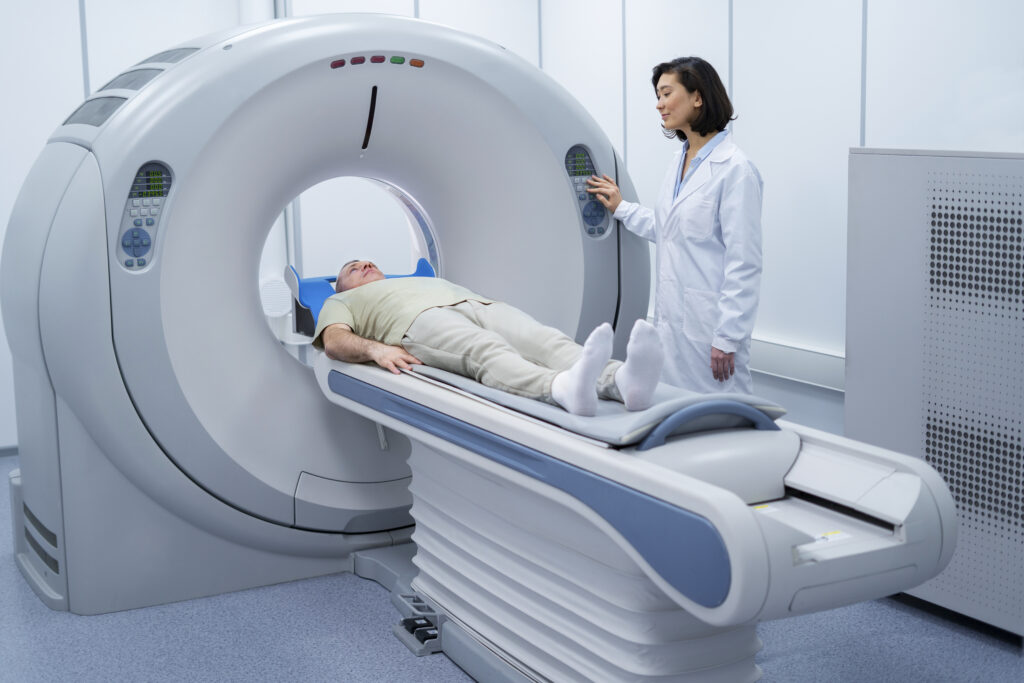Table of Contents
Prostate cancer is one of the most common forms of cancer among men, and its detection and management are crucial to improving outcomes and quality of life. In recent years, the PSMA PET scan has emerged as a game-changer in the detection, staging, and monitoring of prostate cancer. At Ace Imaging, we are committed to providing the latest and most advanced imaging techniques to ensure accurate diagnosis and effective treatment plans for our patients. In this blog, we will explore the top 5 reasons why a PSMA PET scan is highly recommended for prostate cancer patients.
What is a PSMA PET Scan?
Before we dive into the reasons for recommending a PSMA PET scan for prostate cancer patients, let’s understand what this imaging technique entails. PSMA, or Prostate-Specific Membrane Antigen, is a protein found in high concentrations on the surface of prostate cancer cells. The PSMA PET scan is a type of positron emission tomography (PET) scan that uses a radioactive tracer designed to bind specifically to PSMA proteins. This allows doctors to accurately visualize prostate cancer cells, even in their early stages, and track their spread throughout the body.
This cutting-edge imaging technique is revolutionizing the way prostate cancer is detected, monitored, and treated.
Top 5 Reasons Why a PSMA PET Scan is Recommended for Prostate Cancer Patients at Ace Imaging
1. Highly Accurate Detection of Prostate Cancer
The PSMA PET scan is one of the most accurate imaging tools available for detecting prostate cancer. Traditional imaging methods like CT scans and bone scans may miss small or early-stage tumors. However, PSMA PET scans provide a much higher level of sensitivity and specificity, allowing doctors at Ace Imaging to detect prostate cancer even when it is in its early stages or when it is in areas that are difficult to reach with conventional imaging.
This is particularly beneficial for:
- Detecting Recurrence: The PSMA PET scan can help identify recurrence of prostate cancer after treatment, even if traditional methods do not show any signs.
- Localizing Cancer Spread: It can detect the spread of cancer to lymph nodes or other distant parts of the body, which can influence treatment decisions.
With PSMA PET scans, doctors can make a more informed diagnosis and tailor treatment plans more effectively, improving the overall prognosis for prostate cancer patients.

2. Enhanced Staging and Treatment Planning
Accurate staging of prostate cancer is crucial for determining the most appropriate treatment plan. The PSMA PET scan helps determine the extent of cancer spread in a way that is far more detailed and precise compared to conventional imaging techniques. By identifying small metastases in lymph nodes, bones, or other organs, the PSMA PET scan provides valuable information that helps oncologists determine whether the cancer is localized or has spread.
At Ace Imaging, we use PSMA PET scans to assess:
- Primary Tumor Location: Identifying the exact location of the prostate tumor to help plan surgical removal or radiation therapy.
- Lymph Node Involvement: Detecting cancer spread to nearby lymph nodes, which may affect treatment decisions and the need for additional therapies like chemotherapy or targeted therapies.
- Distant Metastasis: Identifying the presence of cancer cells in distant organs like the bones, liver, or lungs, which helps assess the stage and decide whether systemic treatments are necessary.
By providing a more accurate picture of the cancer’s stage, the PSMA PET scan helps doctors at Ace Imaging recommend a personalized, comprehensive treatment approach that can increase the chances of successful outcomes.
3. Non-Invasive and Safe Procedure
One of the most significant advantages of the PSMA PET scan is that it is a non-invasive imaging technique. Patients do not need to undergo painful or invasive procedures, such as biopsies, to obtain critical information about the extent of their prostate cancer. Additionally, the PSMA PET scan uses a low dose of radioactive material that is safe for patients.
The procedure involves a small injection of a radiotracer, which binds to PSMA proteins on prostate cancer cells. The patient then lies on a table while a PET scanner captures detailed images of the body. The entire process typically takes 30 to 45 minutes and requires minimal preparation. The non-invasive nature of the procedure makes it a highly preferred option for prostate cancer patients, especially those who may already be dealing with the stress and discomfort of cancer treatment.
Pro Tip: At Ace Imaging, we ensure that all our patients are made comfortable throughout the process, and our team of experts closely monitors every step of the procedure.
4. Monitoring Treatment Response and Early Detection of Relapse
One of the biggest challenges in prostate cancer management is monitoring the effectiveness of treatments and detecting early relapses. The PSMA PET scan plays a crucial role in tracking how well the cancer is responding to treatment, whether it’s surgery, radiation therapy, or hormone therapy.
As prostate cancer responds to treatment, the PSMA PET scan can show whether the tumor is shrinking or whether new areas of metastasis are developing. This allows for timely adjustments to the treatment plan. In cases where prostate cancer is hormonally resistant or has become refractory to therapy, the PSMA PET scan can identify areas of recurrence before they show up on traditional imaging scans.
By catching cancer relapse early, doctors at Ace Imaging can implement targeted treatments sooner, improving the likelihood of a positive outcome. In some cases, this could mean offering more aggressive therapies or switching to different treatment options to control the disease.
5. Personalized Treatment Decisions and Better Patient Outcomes
With its high level of accuracy, the PSMA PET scan enables a more personalized treatment approach for prostate cancer patients. Armed with detailed information about the tumor’s exact location, spread, and response to treatments, doctors can make more informed decisions about how to manage the disease.
A more personalized approach to treatment allows patients to:
- Avoid Over-Treatment: By accurately identifying the spread of cancer, doctors can avoid over-treating non-aggressive forms of prostate cancer, preserving patients’ quality of life.
- Tailor Therapy Plans: Whether it’s surgery, radiation therapy, or systemic treatments like chemotherapy, doctors can customize the treatment plan based on the specific needs of the patient.
- Improve Outcomes: By using the PSMA PET scan to monitor the progression of the disease and adapt treatment as needed, patients are more likely to achieve better outcomes and longer survival rates.
Conclusion
Prostate cancer can be a challenging diagnosis, but with advancements in imaging technology like the PSMA PET scan, patients in Thane and beyond now have access to cutting-edge diagnostic tools that can greatly improve the accuracy of their diagnosis and the effectiveness of their treatment. At Ace Imaging, we are proud to offer the PSMA PET scan in Mumbai as part of our comprehensive prostate cancer care services.
Whether you’re seeking a diagnosis, exploring treatment options, or monitoring the effectiveness of your current treatment, the PSMA PET scan provides crucial information that can guide your healthcare team in making the best decisions for your health.

